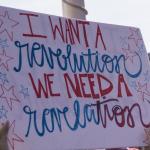Anthropologists study a culture’s taboos. These are more than just moral prohibitions, such as the sanction against adultery, which a person might want to do but has to resist the impulse. Taboos are prohibitions that are unthinkable, that few in the culture would even dream of doing, such as committing incest.
Among many aboriginal tribes in Australia, it is taboo to utter the name of a person who has died. In Polynesia, setting foot on a particular island deemed to be sacred is taboo. Certain foods might be taboo, as pork is for Jews and Muslims. Taboos often center, as ours do, around sex, the body, and religion.
We have been discussing the findings of Eric Kaufman, professor of politics at the University of London, whose article The Great Awokening and the Second American Revolution studies the “cultural revolution” being pursued by many American progressives. He observes that one way they are proceeding to shape cultural opinion is to overthrow old taboos and to replace them with new ones (my bolds):
Homosexuality and atheism, for instance, are no longer the taboos they once were. The erosion of those taboos contributed to liberalism, but what happens when taboos tack in the opposite direction, toward an authoritarian censorship of critics of atheism and gay marriage, in the name of preventing “harm”? This barely perceptible change, from negative to positive liberalism, has enormous implications for human freedom. It’s in full swing because today’s dominant ideology of left-modernism has discovered that controlling social norms is the key to shifting the flock in its desired direction. The Right has been caught flat-footed, obsessed by tax cuts and foreign policy, both of which coincidentally (?) allow it to steer clear of the sacred cows of left-modernism.
The taboos against homosexuality and atheism have been overthrown, only to be replaced by taboos against opposing homosexuality and atheism!
I can see another example of taboo replacement in the taboos against certain kinds of words. Traditionally, our culture has had taboos against saying certain words about sex and “bodily functions.” Another category of “bad language” had to do with religious words, with “profanity” (profaning something sacred, such as the name of God used in an irreverent context) or “cursing” (calling down divine judgment). To be sure, sometimes this taboo language was uttered, but not in “mixed company” where both men and women were present, not in the presence of children, and not in formal public settings. But such language was always considered disreputable, “vulgar” (of the lower classes), and morally wrong.
Today, though, such language–including the most taboo word for sex–has become commonplace. You might hear it at the office, among school children, in conversations between men and women, and in our entertainment media.
But while the taboo against those kinds of words has been overthrown, new linguistic taboos have arisen to replace them. Now derogatory words for race, ethnicity, sexual orientation, and gender identity have become taboo. And whereas the social sanction against the older words was relatively mild, consisting mainly of disapproval, saying the new forbidden words–such as the most taboo word for African-Americans when uttered by a white person–can make you lose your livelihood, even if it was said long ago.
Do you see new taboos emerging or people trying to impose new taboos? Regarding food, for instance? Or the Coronavirus?
What happens, though, when you have groups of people with different taboos? Since taboos are so fundamental to cultural identity, groups that don’t abide by other groups’ taboos are going to constitute separate cultures. Not only that, since violating a taboo is “repulsive,” the groups will be repulsive to each other.
Image by Gerd Altmann from Pixabay














